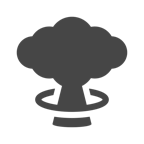A newspaper drifted by yesterday with the headline:
NUCLEAR WEAPON MISFIRES, DROPS ON UNSUSPECTING FARMLAND IN IOWA
• • •
That explained some things: the wreckage of the farmhouses strewn across the cornfields, the flatness of my fingers where they pressed against the stone walls of the barn, and my inability to peel myself away from this building. I’m dead, and my shadow was burnt into the stone by the superheated flames of the explosion. It was a fission bomb, the newspaper said. A North Korean-made and plutonium-powered behemoth that discharged from a submarine in the Pacific and was likely meant to target Portland or Seattle. How it ended up in Iowa remains a state secret that will never be revealed, because shortly after I died the United States retaliated, and nearly 95% of the North Korean population was obliterated mere hours after the first bomb dropped.
Who knows how many people have died since then.
• • •
My mother came to visit me this afternoon—not me in particular but the house, the fields, the stump of the grain silo where once we stood, allowing the feed to rain down on us like golden beaches, until my father shuttered the narrow slit we had opened at the top and yelled at us to run for the shower lest the pulverized kernels cloud our lungs with dust. My father wasn’t the kind of landowner who tolerated whimsy. When the bomb hit, no doubt he was at work in the corn. I like to think of him sitting on his tractor, the seams of his hat being atomized as the explosion swept a burning hand across the plains, flattening all that he had accomplished.
Had I been given a choice during the divorce proceedings, I would’ve elected to live with my mother, who left us one morning at the crack of dawn then returned years later wearing black jeans, a bloody tank top, and a pair of weathered combat boots that looked a few sizes too big. She clomped awkwardly through the disaster area—hair pulled into a fierce ponytail, arms raised to accommodate a semi-automatic rifle too large to carry at her side without dragging the muzzle through the blackened soil. She kept pausing here and there to inspect something: the skeleton of a stray dog, perhaps; the burned husk of the tractor where I imagine thin ribbons of my father are still seared on the metal. I wonder if enough of him has survived to coalesce into a consciousness like mine. If he’s thinking of me, as I’m thinking of him.
But my mother didn’t linger over that tractor—not like she did when I gathered the disparate elements of my self and arranged them once again into the shape of a nine-year-old girl with pigtails and a cowlick. She pressed her hand to the shadow of my hand and wept an apology for abandoning me. I tried to tell her it wasn’t her fault. I heard what she told me the night before she left: she was sixteen when she got pregnant, a child in her own right; her parents had sent her to Cedar Rapids to visit relatives that summer and because she was bored—and often alone while her aunt and uncle worked—she took up with a boy in town (my father) who worshipped her and treated her to ice cream daily. My father was fun then; he had dreams. On their first date, he took her to see the Devonian Fossil Gorge in Coralville, Iowa and laid his hand over hers as she traced the outlines of the prehistoric creatures. She swore the kiss was innocent at first—their affair one she never expected to last—but there she was, a wife and mother looking up out of herself for the first time in ages, thinking, This isn’t my life; this can’t be my life. So she did something about it. I understood, even back then. When she brushed a finger over the blackened stone of my cheek, I knew: she had to go.
• • •
The war was coming—the war and the rain. Now I can feel the radioactive waters rushing into the crevices that were once the insides of my elbows, the backs of my knees, the small of my back. I can feel rivulets prying pieces of me loose. One atom here, another there. If given enough time, the elements would wear this stone barn down; return the walls of this building to dust; and redistribute my atoms until I became one with the soil, the grass, the bones buried deep under the burnt fields. But time is a luxury even the dead don’t have. In the distance, I hear gunshots biting the air, engines cutting in and out. Voices, I think, muffled by the endless drumbeat of the rains. I prepare myself for the battle to come. I foresee bullet holes, shrapnel.
I wonder what else I can survive.

Ruth Joffre is the author of the story collection Night Beast, which was longlisted for The Story Prize. Her work has appeared or is forthcoming in Kenyon Review, Lightspeed, Gulf Coast, Prairie Schooner, The Masters Review, CRAFT, Pleiades, and elsewhere.
© 2020 Ruth Joffre. Published by LITTLE FICTION | BIG TRUTHS, May 2020.
Editors: Troy Palmer, Beth Gilstrap & Alvin Park. Images from The Noun Project (credit: Arthur Shlain).

The 2020 Flash Issue:





































